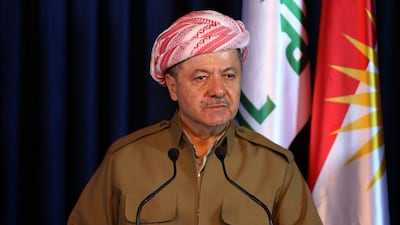Senior members of the two dominant parties in Iraq's Kurdish region have said they oppose moves in the Iraqi Parliament to pass a law to force US troops to leave the country, indicating the challenge facing Prime Minister Mohammed Shia Al Sudani's government to reach a national consensus on the issue.
Mr Al Sudani has faced mounting pressure from Iran-backed Shiite militias and political factions to expel US forces following an increase in attacks between them since the Israel-Gaza war began in October.
Baghdad and Washington have held at least two rounds of talks since late last month to end the mission in Iraq of the US-led international coalition formed in 2014 to fight ISIS.
To strengthen the government's position in the discussions, the Shiite political factions who make up the majority in Parliament have been pushing for a law to force the departure.
However, Masoud Barzani, head of Kurdistan Democratic Party – one of two main parties that share power in the Kurdish region, warned that the threat from ISIS remained despite its military defeat in late 2017.
“All Iraqi components must realise that the threat of terrorism and its reappearance remains valid,” Mr Barzani told the US Charge d'Affaires David Burger during a meeting on Wednesday, according to a statement released by his office.
He said the “interests, stability and security of all Iraqi regions and components must be taken into consideration”.
“This issue is a national matter and not specific to a particular component,” said Mr Barzani, who also served as the president of the three-province Kurdistan region until 2017.
He said the issue was “not within the jurisdiction of the Parliament” and that it “must be kept away from the political bidding and regional equations to preserve Iraq’s interests”.
Mr Barzani’s statements echoed those by Deputy Prime Minister of Kurdistan, Qubad Talabani, who is linked to the KDP's rival, the Patriotic Union of Kurdistan.
“I see that we are not in post-ISIS period yet and it is still there and poses a threat,” Mr Talbani told a conference on innovation and entrepreneurship in Kurdistan late last month.
On Saturday, a request for the new law backed by at least 100 MPs in the 329-member assembly was referred to Parliament’s Legal and Security and Defence Committees. Kurdish and Sunni lawmakers were absent.
The US has 2,500 troops in Iraq, advising and assisting local forces to prevent a resurgence of ISIS, which in 2014 seized large parts of Iraq and Syria before being defeated.
Hundreds of troops from mostly European countries are also part of the coalition.
Iraq's government says ISIS is defeated and the coalition's job is over.
However, a US withdrawal would probably increase concern in Washington about the influence of Iran over Iraq's ruling elite.
Since October, Iran-backed militias and US troops have been involved in tit-for-tat attacks. The militias say their attacks against US troops in Iraq and Syria, which have injured dozens of personnel, are in response to Washington's support for Israel in its fight against Hamas in Gaza.
Three US soldiers were killed in attack on base in Jordan last month that the US blamed on Iran-backed Iraqi militias, while dozens of Shiite fighters have been killed in retaliatory strikes by the US military, including a senior militia leader.


